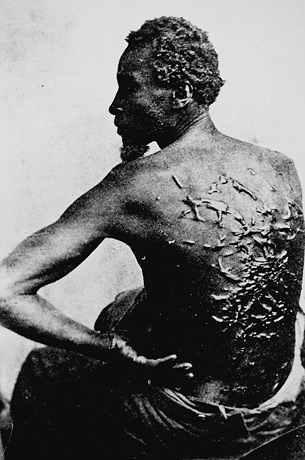"I got a tree on my back and a haint in my house, and nothing in between but the daughter I am holding in my arms. No more running-- from nothing. I will never run from another thing on this earth. I took one journey and paid for the ticket, but let me tell you something, Paul D Garner: it cost too much. Sit down and eat with us or leave us be."
"What tree on your back?..."
"What tree on your back? is something growing on your back? I don't see nothing growing on your back."
"It's there all the same."
"Who told you that?"
"Whitegirl. That's what she called it. I've never seen it and never will. But that's what she said it looked like. A chokecherry tree. Trunk, branches, and even leaves. Tiny little chokecherry leaves. But that was eighteen years ago. Could have cherries to for all I know ." (pg 18).
In this quote there are two major things happening. The first part of the quote Sethe reveals a true inner thought of how she's had enough of world has given her but from now on she's embracing every moment of what life has in plan for her, despite her past hardships and future ones to come as well. The second part of this quote was what really got my attention. At first when reading that Sethe said she had a "tree" growing on her back I was just as confused as Paul D when he first heard that out of The mouth. I then took into historical context of when Sethe was a child and still a slave because that's when the "whitegirl" told her she had "chokecherry tree" growing on her back. I then realized that that "chokecherry tree" on Sethe backs was due to the fact that she was whipped when she was still a slave and were the scars from those whippings. I believe that since maybe the little white girl that told Sethe she had that tree on her back was because she never actually witness when the slaves were getting whipped and never noticed any scars like that on other white people. So the little white girl was probably fascinated by Sethe whip marks and instead of seeing the actual dark truth behind it she saw the beauty behind these lash marks. She made Sethe believe that there was this beautiful chokecherry tree growing on her back with actual "branches" and "leaves" coming out of it. Sethe accepts that there's an actual tree growing on her back because she states how she paid the price for this life and is embracing every moment. If Paul D wants to walk out she won't do any to change his decision because no matter what she's not leaving the house despite if haunted or not.
The other main part when Sethe gives a speech to Paul D on why she isn't running from anyone or anything anymore. She got defensive when Paul D felt the bad presence in Sethe house and wanted to leave. She’s tired of running because we can tell through context that her life previously as a slave has been the worst. She’s been whipped, beat, and probably raped. She accepts that everything has been happening for a reason and since all her kids ran out her and doesn't feel no affection for anyone else willing to run out on her. She’s happy living how she is and is staying with her beloved baby because she knows shes not the only person with a haunted house with the presence of a angry black baby. Even Paul D openly admitted that beloved isn't the only angry black baby for all the oppression they have been through and woudn’t blame them for their anger on having a negative spiritual presence. That’s probably the main reason why Sethe doesn’t want to leave her house despite the bad spiritual presence because she feels for what beloved feels of all the negative impacts that slavery has had on Seth which affected beloved as well which i'm sure of.

